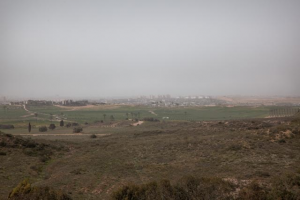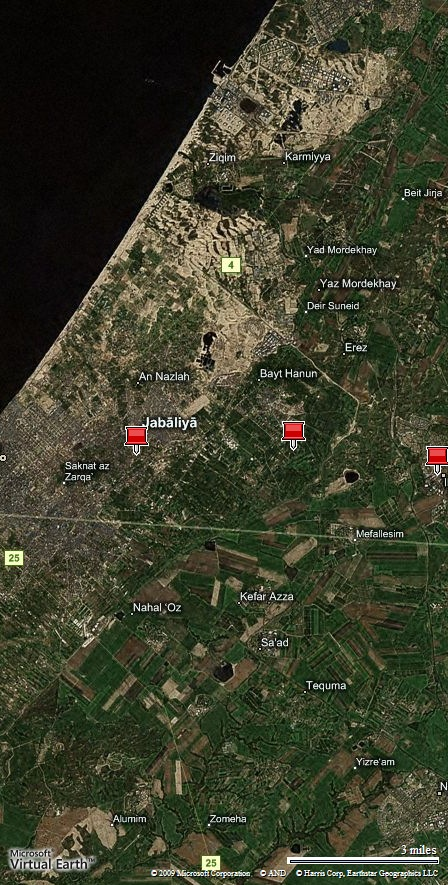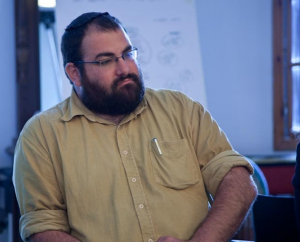Religion is a tricky thing in Israel. Israel has all the trappings and appearance of a secular democracy. There are elections. There is no explicit approval/disapproval of policy or candidates or the serving government by any religious authority. There is freedom of conscience and freedom of religious practice for non-Jews and non-orthodox Jews. Non-Jews, specifically Muslims, are citizens, may vote, may serve in the government, and—at least on paper—have full civil and economic rights. In practice, there are meaningful obstacles to Muslims and Arabs (who might be Christians) exercising the full benefits of citizenship.
But, it would be going too far to say there is separation of church and state as in the United States. Judaism is not established as the state religion of Israel. This is different than most Muslim countries and some European countries. Surprisingly, some of the most secularized European countries have official state religions including England (Anglican), and Denmark, Iceland, Norway, and Finland (all Lutheran). Israel does define itself as a “Jewish democracy.” Jewish here might mean the historic people and descendants who are Jews or those who practice the Jewish religion. The practical outcome is that Israel seeks to preserve a situation in which Jews can be safe in Israel, express their historic and religious identity,and be a clear majority of the population and the electorate. And there are some specific legal entanglements, shall we say, that will be discussed momentarily.
Wikipedia does a nice job of expressing some of the nuances of the Israeli situation from a strictly legalistic standpoint:
Israel is defined in several of its laws as a “Jewish and democratic state” (medina yehudit ve-demokratit). However, the term “Jewish” is a polyseme that can relate equally to the Jewish people or religion (see: Who is a Jew?). The debate about the meaning of the term Jewish and its legal and social applications is one of the most profound issues with which Israeli society deals. At present, there is no specific law or official statement establishing the Jewish religion as the state’s religion. However, the State of Israel supports religious institutions, particularly Orthodox Jewish ones, and recognizes the “religious communities” as carried over from those recognized under the British Mandate. These are: Jewish and Christian (Eastern Orthodox, Latin [Catholic], Gregorian-Armenian, Armenian-Catholic, Syrian [Catholic], Chaldean [Uniate], Greek Catholic Melkite, Maronite, and Syrian Orthodox). The fact that the Muslim population was not defined as a religious community is a vestige of the Ottoman period[citation needed] during which Islam was the dominant religion and does not affect the rights of the Muslim community to practice their faith. At the end of the period covered by this report, several of these denominations were pending official government recognition; however, the Government has allowed adherents of not officially recognized groups freedom to practice. In 1961, legislation gave Muslim Shari’a courts exclusive jurisdiction in matters of personal status. Three additional religious communities have subsequently been recognized by Israeli law – the Druze (prior under Islamic jurisdiction), the Evangelical Episcopal Church, and the Bahá’í.[1] These groups have their own religious courts as official state courts for personal status matters (see millet system).
OK, let’s get practical here. There is a Ministry of Religious Affairs. It directs the Chief Rabbinate of Israel as well as supporting the other recognized denominations. There is a Chief Rabbi of Israel. There is a Chief Rabbi of the Israeli Defense Force. The state supported educational system provides explicit support for 2 branches of Jewish education. So, in addition to secular public schools there are Jewish schools which include a full secular curriculum (including English, math, science, history, etc.) and specific Jewish instruction. Beyond these Jewish schools are government supported Jewish religious schools (heder) which are not required to offer any secular subjects at all. There are also government supported Arab schools which blend a little bit of Muslim religion, instruction in Arabic, and a full secular curriculum.
Now let’s see what’s really going on with the government. Then, we’ll look a little more broadly at society at large. Because the Chief Rabbinate is Orthodox, there is strong preference for Orthodox Judaism and little support for other branches of Judaism (Conservative, Reform, Liberal, Reconstructionist). In the US, Orthodox means orthodox, But, in Israel there are at least 4 flavors of Orthodox. There are ultra-orthodox Jews, or Haredi Jews—Haredim, who try to minimize any participation in the secular world. Most are Hasidic Jews who live and look like they would have in the 18th century in Lithuania (mostly present day Poland and parts of Ukraine and Belarus). There are non-Hasidic Haredi as well (Mitnagdim—let’s forget the distinctions before your head breaks). They don’t serve in the army. Men don’t work; they study Torah, Mishnah, and Talmud. Their wives work and bear 8-12 children. The state provides a monthly stipend of 600 shekels to married yeshiva students and 400 shekels to unmarried yeshiva students—life long. Within Hasidism are the hereditary rabbinic courts from Eastern Europe such as the Satmars, Breslovers (followers of Rabbi Nachman), and Lubavitchers (followers of Rabbi Zalman). These guys wear long coats, broad-brimmed fur hats, and have the curls on the sideburns (paes). (photo, below: Poster of Rabbi Nachman, the Breslover rebbe, in Safed)
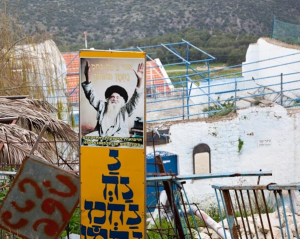
Then there are the “nationalistic” orthodox. They may have been Hasidic or may have had some or even a lot of secular education. They participate in secular and political life to the extent it fulfills primarily religious goals. They tend to treat the bible (Old Testament or Pentateuch or Torah) as a deed to any land mentioned in the bible. They want to reclaim any sites where Jews may have lived in Judah and Israel (Samaria) from ancient times. Some serve in the army. They are the core of the settlers in the West Bank. These guys wear black crocheted kepahs (yarmulkes) and modern clothes.
Next we have modern orthodox. These are the folks that may go to Yeshiva University in New York. They are observant orthodox Jews but they have thorough secular educations and often work, quite successfully, in secular jobs. Just one step to the left of them are liberal orthodox who differ only in openly pushing for religious reforms, especially more rights for women to fully practice their Judaism.
There is no explicit government support for the Conservative and Reform movements of Judaism. Indeed, the Orthodox consider them threats or apostate or worse. You might as well be Muslim or Christian—in fact, if you are doctrinaire fundamentalist Muslim or Christian you would be more “understandable” to the ultra-orthodox, if no better liked, than some apostate liberal, secularized demi-Jew. There are real consequences to these distinctions. A person who converts to Judaism under Conservative or Reform auspices won’t be recognized as Jewish. This means you could not participate in a Jewish marriage—because it would be viewed as a mixed marriage or secular marriage. This is because there is no civil marriage in Israel: you must have a marriage sanctioned by one of the denominations recognized by the Ministry of Religious Affairs. You go get married in Cyprus or the US or Europe—then you come back to Israel and you’ll be married legally, but it won’t be a religious marriage. And, if your Jewish conversion is not recognized then you can’t be buried in the Jewish part of a cemetery. There are areas set aside for “non-Jews” so there is somewhere to put your remains. The Rabbinate actually maintains a list of the Orthodox rabbis around the world who are deemed able to perform recognized Orthodox Jewish conversions.
Despite the lack of official state “establishment” of Judaism as a state religion, there are some insidious effects in politics. There are several expressly Jewish politcal parties: Shas is Sephardic Jewish (Jews historically from Spain, Northern Africa, and the middle East); United Torah is Ashkenazi ultra-orthodox Jewish (Jews historically from eastern Europe), National Union is what I guess you could call the Zionist orthodox Jewish party. These affiliations are not completely stable and these parties—even members within them—don’t agree on everything. But, there are some shared tendencies. All are against negotiating with the Palestinians. All want to preserve their special entitlements with the government. The insidious thing is that none of the large political parties in Israel have enough votes to form a majority in parliament (the Knesset) so the plurality party will enter into a coalition which includes one or more of these religious parties, which then hold the coalition hostage to various demands. For example, in the latest election Shas demanded that monthly stipends for Yeshiva students be increased by 50% as a condition of being in the government—they got it.
In society, religion gets more multi-faceted. You’d think Israel was a step away from becoming a Jewish Iran, but it’s not. There are about 5.4 million Jews in Israel. About 600,000-800,000 are Haredi. So, this minority has disproportionate influence on religious life in Israel. Most Jews in Israel are non-observant “Orthodox.” This is sort of like being Catholic in France or Italy. You are Orthodox because that’s the way to get married, get an education, and not get hassled. But, you don’t really do anything at any time other than the high holy days, Passover, marriage, and circumcision. You may or may not keep kosher. But, you are not disruptive enough to overtly practice as a Conservative or Reform Jew. Likely, you don’t practice at all.
There are pretty big regional differences. Tel Aviv is the swinging urban place and most Jews there are non-observant. There are plenty of non-kosher restaurants (where you can have a cheeseburger or even pork). Haredi are mostly in Jerusalem, Safed, and other communities. It’s harder to find a non-kosher restaurant in Jerusalem. There are Haredi only neighborhoods in Jerusalem, Haifa, Akko and other places. While there are no laws supporting exclusion you’ll get no legal help in breaking the resistance of someone who refuses to sell or rent to you in one of these neighborhoods.
Islam is also rather interesting in Israel. Historically, the Palestinians (some of whom are Christian but let’s focus on Muslims for now) were among the most educated, professional, affluent, and progressive in the western sense of any Muslim groups. They are certainly loyal Muslims but tended not to be fundamentalist or even particularly observant. For example, one doesn’t see many headscarves in the old city in Jerusalem. Many Arab Muslims who have lived in Israel since 1948 (and, of course, before) would probably tolerate Israel’s Jewish identity if they really had fully equal civil and economic rights and could participate in the government and society. But, with Israel’s harsh response to the two Intifada’s, the Lebanon invasion, and the military response in G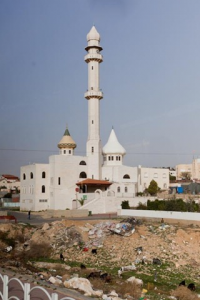 aza, many Arabs in Israel feel more affinity to the West Bank Palestinians. Gaza especially and the West Bank to a lesser extent are getting economic support from more Islamicist organizations, Hamas and Hisbollah. We saw strong Islamicist support for the Bedouin in Israel, who were historically not religiously observant. So, it will be interesting to see if Muslims in Israel become more openly religious. If so, I tend to think it will spring from a politcal impetus and not primarily from some autonomous increase in religious fervor. (photo, right: brand spanking new mosque in Rahat, Israel’s largest settled Bedouin village)
aza, many Arabs in Israel feel more affinity to the West Bank Palestinians. Gaza especially and the West Bank to a lesser extent are getting economic support from more Islamicist organizations, Hamas and Hisbollah. We saw strong Islamicist support for the Bedouin in Israel, who were historically not religiously observant. So, it will be interesting to see if Muslims in Israel become more openly religious. If so, I tend to think it will spring from a politcal impetus and not primarily from some autonomous increase in religious fervor. (photo, right: brand spanking new mosque in Rahat, Israel’s largest settled Bedouin village)
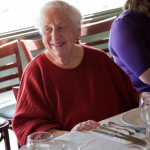 Women’s rights are also a bit complex. In traditional Orthodox practice, women worship separately from men and cannot participate in the Torah service nor read Torah to the congregation. Alice Shalvi leads a great organization fighting for pluralism and women’s rights within Judaism including the right of orthodox Jewish women to participate fully, the right of other Jewish denominations to practice, the right of converted Jews to be married and buried in Israel, and the right to civil marriage. It is a sterling organization of nobility and dignity. For all these seeming constraints, Israeli society is very open for women. Women serve 2 obligatory years in the military, graduate from college, and hold professional jobs. There is a certain Israeli machismo, but it is not universal. Homosexuals, including lesbians, have full economic and civil rights. A religious homosexual marriage will be recognized. Homosexual couples receive health care benefits. This is certainly not because orthodox Jews are enamored of homosexuality—far from it; it’s just that there were never any laws against, so it goes. (photo, left: Alice Shalvi)
Women’s rights are also a bit complex. In traditional Orthodox practice, women worship separately from men and cannot participate in the Torah service nor read Torah to the congregation. Alice Shalvi leads a great organization fighting for pluralism and women’s rights within Judaism including the right of orthodox Jewish women to participate fully, the right of other Jewish denominations to practice, the right of converted Jews to be married and buried in Israel, and the right to civil marriage. It is a sterling organization of nobility and dignity. For all these seeming constraints, Israeli society is very open for women. Women serve 2 obligatory years in the military, graduate from college, and hold professional jobs. There is a certain Israeli machismo, but it is not universal. Homosexuals, including lesbians, have full economic and civil rights. A religious homosexual marriage will be recognized. Homosexual couples receive health care benefits. This is certainly not because orthodox Jews are enamored of homosexuality—far from it; it’s just that there were never any laws against, so it goes. (photo, left: Alice Shalvi)
There are many Jews who carry on their day-to-day lives as if Israel were a fully secular society. Certainly in Tel Aviv it is easy to do. And they feel secure in their Jewish identity as part of an historic people with or without actively practicing Judaism. Many Catholics throughout Europe don’t set foot in a church, but would never renounce Catholicism. Many Protestants in the US aren’t actively religious but would never for a moment doubt that they were Christian. So it is with many Jews in Israel—they just want to be “normal” and not think about any religious or identity-based threat or fear. The difficulty comes in reconciling this with being a democracy. From a practical standpoint it means extending full civil rights and rights of conscience to adherents of other faiths while maintaining a numeric Jewish majority in the electorate. But, that is another whole issue in itself….
